Pompeii: Tickets and Tours
The ancient ruins of Pompeii are arguably the most famous uninhabited city in the world, providing visitors with a fascinating slither of ancient Roman life — perfectly frozen in time and waiting to be explored during a day trip to Pompeii from Naples.
Once, Pompeii was a thriving resort city, with Rome’s rich and powerful heading to the coast for a break from the capital’s intrigues and machinations. That all changed on a brisk autumn day in 79 AD, when the brooding presence of Mount Vesuvius erupted in a fit of fury. The resulting pyroclastic flow traveled at speeds of up to 725 kilometers an hour and temperatures reached 700 degrees Celsius, killing the populace instantly.
At the same time, a suffocating layer of ash covered the city, preserving its final moments for millennia to come. Today, much of Pompeii has been uncovered, providing travelers with an invaluable glimpse into the day-to-day life of Ancient Rome.
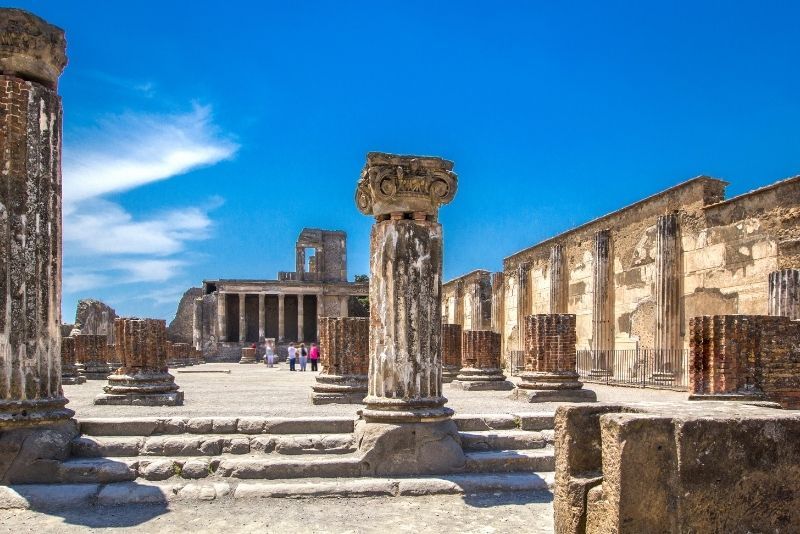
Here's all you need to know about Pompeii, one of the most exciting attractions in Naples.
How to get to Pompeii from Naples?
The ancient city of Pompeii is located a couple of kilometers southeast of Naples, on the southern edge of Mount Vesuvius. The Pompeii Archeological Park is situated almost exactly in the middle between the cities of Naples and Sorrento — making it an ideal destination for a day trip or shore excursion from either.
From Naples to Pompeii by car
Driving from Naples to Pompeii is relatively straightforward and you’ll pass many other famous sites and attractions. From the port of Naples, take the A1 southwards out of the city, changing onto the E45 as it skirts the western edge of Vesuvius.
The entire drive is approximately 25 kilometers long and will take roughly 20 minutes to complete.
From Naples to Pompeii public transport
There are many ways to travel between Naples and Pompeii using public transport; the most convenient of these is the Salerno rail service.
Leaving from Napoli Porta Nolona or Garibaldi Centrale, board the L-train and stay onboard for eight stops before alighting at the Pompeii Archeological Park. A one-way journey will take you approximately 30 minutes to complete.
Guided tour to Pompeii from Naples
A guided tour to Pompeii is ideal if you don’t want to spend energy dealing with Naples’ infamous traffic or deciphering train schedules.
You’ll have an experienced tour company to handle all the logistics for you, ensuring a hassle-free day out. Plus, you’ll enjoy the company of a dedicated guide who’ll lead you through the ruinous city while telling you more about ancient Roman customs.
How much does the entrance ticket to the Pompeii Archaeological Park cost?

There are a number of ticket options available to travelers who want to discover the secrets of ancient Pompeii.
Pompeii Express entrance tickets
- General admission: €20
- EU citizens (aged 18 to 25): €2
- Youth (aged 0 to 18): Free
This ticket option excludes the suburban areas of the city.
Pompeii Plus entrance tickets
- General admission: €24
This includes access to Pompeii, as well as a tour of the suburban villas. There are no reduced ticket options available for this experience.
Pompeii 3-day pass entrance tickets
- General admission: €28
This ticket grants visitors access to Pompeii for a total of three days. It includes all the sites visited in the “Pompeii Plus” ticket — as well as Oplontis, the Villas Arianna and San Marco, the Libero D’Orsi Museum and a shuttle bus for convenient travel between the attractions.
Discounted tickets (youth tickets and EU citizens aged 18 to 25) cannot be bought in advance. You’ll need to obtain these from the ticket office at the Pompeii Archaeological Park.
People with disabilities are also entitled to free tickets, and there are several accessibility options in Pompeii to allow them to visit most of the historical site. A day trip from Naples might be a good idea for people with specific needs because it's usually more convenient than public transportation.
What is the typical itinerary?
A typical day tour from Naples to Pompeii will start with an air-conditioned vehicle picking you up, either from your hotel or from a specified meeting point. Shore excursions from Naples to Pompeii will usually depart from a place near the city port, allowing for a seamless offshore experience from your cruise ship.
Leaving the city behind, you’ll head south, usually skirting the southeastern edge of Mount Vesuvius as you head to Pompeii. Some day tours will include a visit to Mount Vesuvius or the ancient remains of Herculaneum, but these attractions are usually reserved for the more expensive full-day tours from Pompeii.
Once you arrive at Pompeii you’ll enjoy exploring the ancient city — either by following an audio guide and the Archeological Park’s directions or at the side of a qualified local guide. There are also archeologist-led tours available, during which a professional in the field will lead you through the excavations — granting you unparalleled insight into this ancient treasure trove.
Following this, you’ll either head back to Naples, or you might visit nearby Paestum and other attractions, depending on your tour.
What kinds of tours are available to go to Pompeii?
Self-guided tour to Pompeii and Mount Vesuvius from Naples
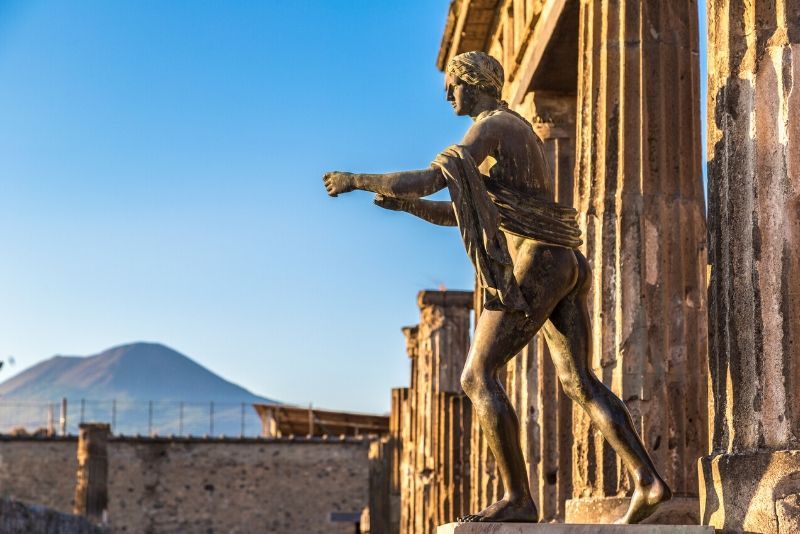
One of the best ways to explore Pompeii’s riches is with the help of a self-guided tour of the ancient city. You’ll enjoy the company of a comprehensive audio guide that you can conveniently download on your smartphone, as well as transport to and from Pompeii.
Another bonus is that this tour includes a visit to Mount Vesuvius, granting you an up-close glimpse of the fiery giant that slew a city. This tour is perfect for solo travelers, or visitors that want to explore Pompeii at their own pace and leisure.
Pompeii half-day guided group tour from Naples
If you’re looking for the perfect balance between overall experience and cost, then this half-day tour to Pompeii from Naples shouldn’t be missed. Your day will start with the convenience of an airconditioned minibus picking you up from your hotel in Naples — and once aboard you’ll meet your expert guide while traveling south towards to brooding presence of Mount Vesuvius and the desolation of Pompeii.
Listen while your guide explains how locals have lived in the shadow of this fiery behemoth for millennia, and how it's shaped life in Campania. Arriving in Pompeii, you’ll enjoy a guided walking tour through the city, exploring the fascinating legacy that was frozen in fire on that fateful day in 79 AD.
Half-day archaeologist-led group tour to Pompeii and Herculaneum
Up until the 18th century, many historians were skeptical about the existence of Pompeii, with the evidence of the city only coming from historical accounts. That changed in October 1738, when a military engineer tunneled through 20 meters of volcanic sediment, only to discover the ancient town of Herculaneum.
Herculaneum was engulfed on the same day as Pompeii, making it the perfect attraction to explore in combination with the famous city — and this half-day tour does exactly that and your tour guide and archeologist will first stop at Herculaneum, before traveling on to Pompeii. Listen as your expert guide explains how these two sites differ, providing the world with views of both city and private life in Ancient Rome.
Pompeii private tour from Naples
A private tour is ideal when exploring a popular destination like Pompeii, making it perfect for a group of friends, a family or a couple. While you’ll still be subjected to the large crowds that Pompeii attracts, your expert guide will help you navigate the throngs of travelers — allowing you an unforgettable day out in Pompeii.
The tour is a full-day affair and includes lunch at a local restaurant, making it well worth the higher price tag. You’ll also be able to determine some aspects of the itinerary — but keep in mind that most of your time will be spent exploring the expensive Pompeii Archeological Park.
Full-day tour from Naples to Sorrento, Amalfi Coast and Pompeii
This full-day guided tour from Naples offers the best that Naples and the surrounding region have to offer, without breaking your budget. Following a pickup from the departure point near the Port of Naples, you’ll head south towards the legendary Amalfi Coast.
Experience firsthand why this slither of shoreline has become a byword for beauty and luxury, before traveling to Sorrento where you’ll enjoy lunch. After enjoying some of the best dishes that southern Italy has to offer, you’ll be free to explore Sorrento on your own.
Following your exploration, you’ll head back north, stopping at the world-famous Pompeii Archeological Park. Follow your guide as they lead you through the remains of the ancient city, before journeying back to Naples.
How much does a day trip to Pompeii from Naples cost?
A self-guided tour to Pompeii and Mount Vesuvius from Naples costs €60 per person, making it the most inexpensive tour option. This includes an audio guide, so consider doing some research before visiting.
For a half-day guided group tour of Pompeii, expect to pay €75 per person. Groups on these excursions with an experienced guide are usually between 25 and 40 people.
A full-day tour from Naples to Sorrento, Positano and Pompeii costs €90 each. Keep in mind that lunch and entrance into the Archeological Park of Pompeii are not included in the price.
The price for a half-day archaeologist-led small group tour to Pompeii and Herculaneum from Naples is €150 per person, with groups capped at nine people.
A Pompeii private tour from Naples costs €600 per group, ranging from 2 to 6 people. This excursion is ideal for people looking to discover the wonders of Pompeii on their own terms and without worrying about crowds.
What will you see and do?
Pompeii Archaeological Park
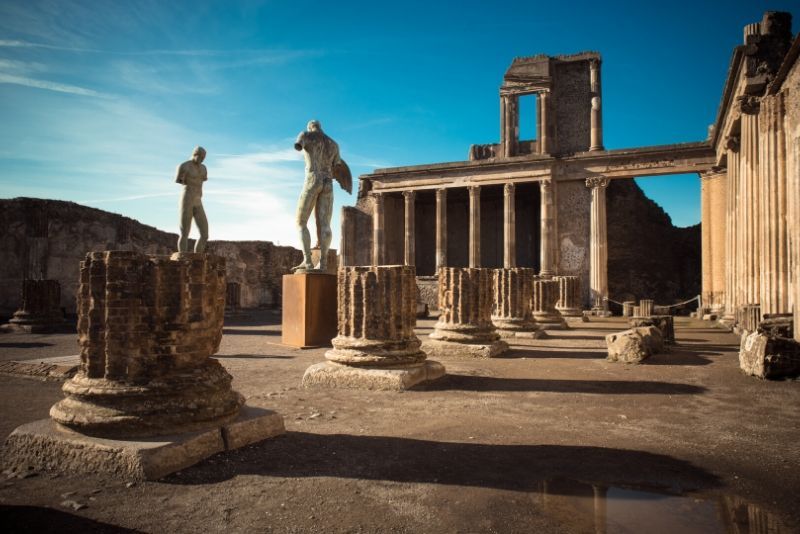
The Archaeological Park of Pompeii attracts over 2.5 million visitors per year, making it one of Italy’s most popular landmarks. The park consists of numerous excavations, both finished and ongoing, and covers an area just shy of 70 hectares.
The remains of the ancient city are divided into 9 regions, each with its own attractions, villas and exhibitions — and visitors should consider setting aside a couple of hours to explore all it has to offer.
Mount Vesuvius
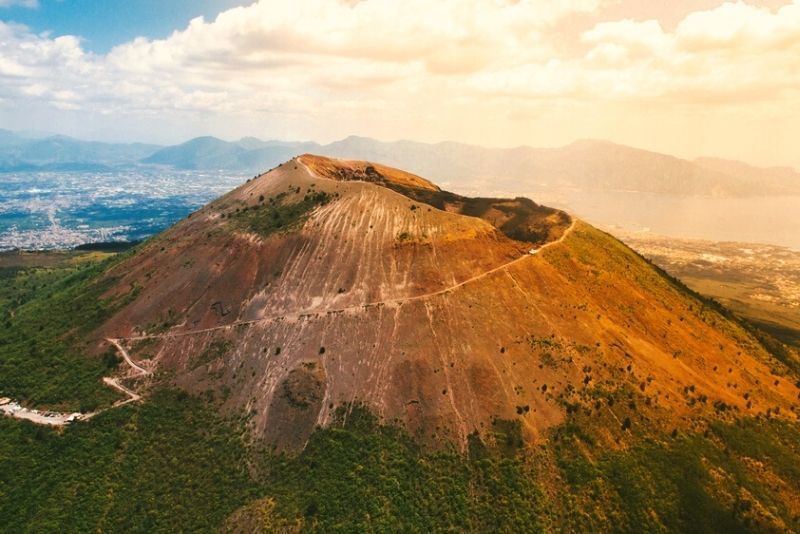
Mount Vesuvius is the volcano that wiped the settlements of Herculaneum and Pompeii from the face of the Earth and visitors can get an up-close look at the volcano during a combination tour from Naples.
The last large eruption from Vesuvius was back in 1944, but the volcano has been relatively subdued since then. On a day trip to Mount Vesuvius from Naples you will get the opportunity to safely explore the volcano, featuring walkways and platforms for an immersive experience.
Herculaneum
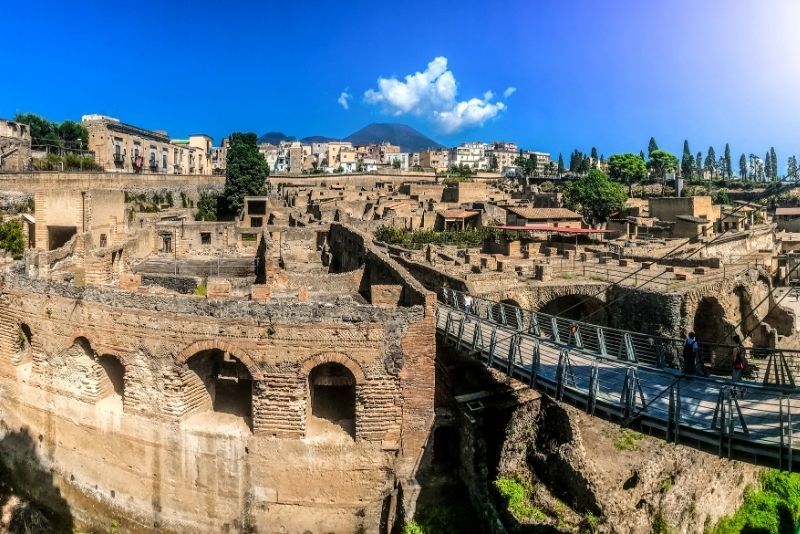
Herculaneum was the other settlement that was destroyed in 79 AD, but it differs from its more famous counterpart in a number of manners. Firstly, Herculaneum was much smaller than Pompeii, with Villas and estates rather than suburbs, allowing an insight into the upper echelons of Roman society.
Secondly, the speed with which the lava flow destroyed Herculaneum is much higher than Pompeii — meaning that the buildings and remains of the victims were preserved differently. Finally, Herculaneum is smaller and less busy than Pompeii, making it easier to explore the once-forgotten town. All these factors combine to make Herculaneum a truly illuminating attraction that shouldn’t be missed.
Amalfi Coast
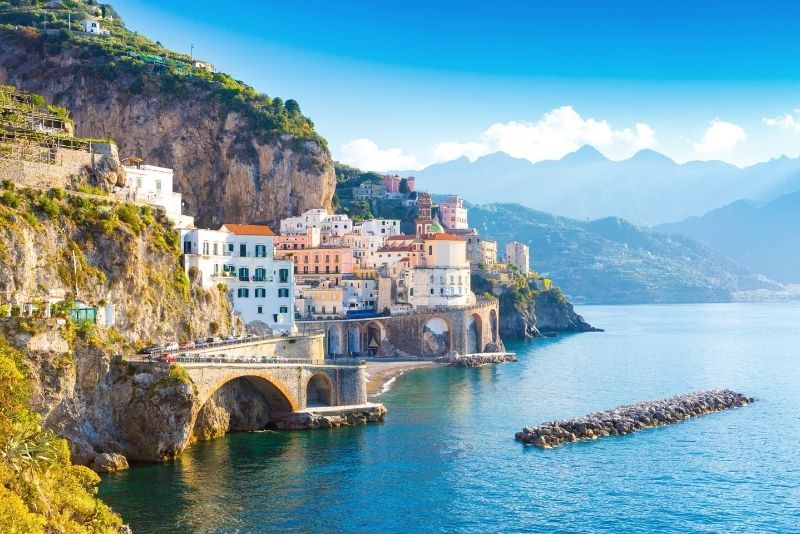
On a day trip to the Amalfi Coast from Naples you will ge to experience one of the most famous and scenic stretches of shoreline in the world, where travelers have been basking in its beauty for centuries.
The 50-kilometer coast is famous for charming villages defying gravity as they cling to steep cliffs, perfectly framed against the azure waters of the Mediterranean. The region is also known for delicious seafood dishes, as well as Limoncello — the perfect drink to enjoy while watching an unforgettable sunset.
What are the opening times?
The Archeological Park of Pompeii is open every day during the following hours:
- 9 AM to 7 PM (April to October)
- 9 AM to 5 PM (November to March)
The Villa Arianna, Villa San Marco (Stabiae), Villa di Poppea - Oplontis and Museo Archeologico di Stabia Libero D'Orsi are closed on Tuesdays.
When is the best time to visit Pompeii?
The best time to visit Pompeii is during spring (April to June) or autumn (September to October). These months offer pleasant weather with fewer crowds, enhancing your experience of exploring the ancient ruins.
Summer months can be extremely hot and crowded, while winter may bring unpredictable weather and shorter visiting hours. Spring and autumn provide a comfortable balance, allowing for a more enjoyable and comprehensive exploration of this historic site.
Are there any tours to Pompeii from other cities in Italy?
Yes, there are tours departing from other cities in Italy:
- Day trips to Pompeii from Rome
- Day trips to Pompeii from Sorrento
- Day trips to Pompeii from Positano
- Day trips to Pompeii from Salerno
- Day trips to Pompeii from Amalfi
- Day trips to Pompeii from Capri
Travel tips
- To avoid the crowds and the midday heat, especially in summer, start your trip early in the morning. Also purchase your Pompeei tickets online in advance to avoid long lines at the ticket office.
- You'll be walking on uneven surfaces, so wear sturdy, comfortable shoes.
- Bring sunscreen, a hat, and sunglasses, as there is minimal shade in the archaeological site.
- There are limited options for food and drinks inside Pompeii, so it's a good idea to bring your own, especially during hot days.